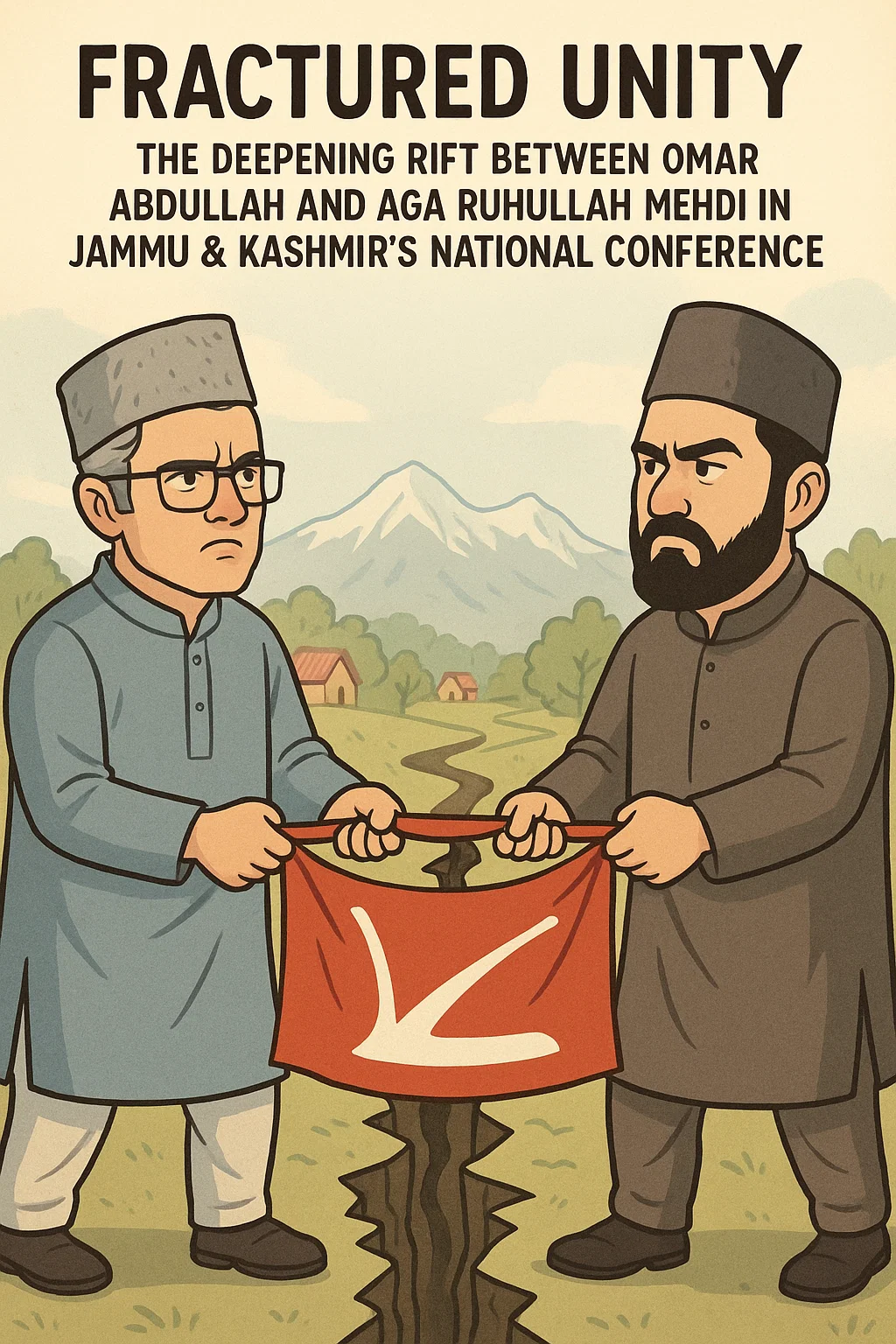J&K Politics in Crisis: Omar Abdullah vs Aga Ruhullah Mehdi – Rift Widens in National Conference
The political landscape of Jammu & Kashmir (J&K) is witnessing a significant upheaval as internal discord within the National Conference (NC) comes to the forefront. The ideological chasm between Chief Minister Omar Abdullah and Srinagar MP Aga Syed Ruhullah Mehdi has not only disrupted party unity but also ignited a broader debate on the region’s future, particularly concerning the restoration of Article 370 and the state’s autonomy.
The Genesis of the Rift
Diverging Visions on Article 370
The abrogation of Article 370 in August 2019, which revoked J&K’s special status, has been a pivotal point of contention. Aga Ruhullah Mehdi has been unwavering in his stance, advocating for the restoration of Article 370 and criticizing any dilution of this demand. He perceives the NC’s softened approach as a betrayal of the people’s mandate and a deviation from the party’s core principles.
Conversely, Omar Abdullah, while acknowledging the significance of Article 370, emphasizes pragmatic governance and believes in engaging with the central government to achieve incremental progress. He argues that a confrontational approach may not yield tangible results and that the focus should be on restoring statehood and ensuring effective administration.
The Walkout Incident
The ideological differences culminated in a dramatic episode during the NC’s working committee meeting, where Mehdi reportedly walked out after a heated exchange with Abdullah. While the party officially denied any such incident, sources suggest that Mehdi’s departure was a manifestation of his growing disillusionment with the party’s direction .
Mehdi’s Perspective: Upholding Ideological Integrity
A Mandate for Restoration
Mehdi contends that the NC’s electoral success was rooted in its promise to restore J&K’s special status. He believes that the party’s current trajectory undermines this commitment and risks alienating its support base. In his view, the struggle for Article 370’s restoration is not merely a political agenda but a moral imperative.
Critique of Governance Priorities
Expressing dissatisfaction with the NC’s governance approach, Mehdi argues that administrative efficiency should not come at the expense of ideological clarity. He fears that prioritizing day-to-day governance over the core issue of autonomy may erode the party’s identity and weaken its position in the long term.
Abdullah’s Standpoint: Navigating Political Realities
Emphasis on Pragmatic Engagement
Omar Abdullah advocates for a balanced strategy that combines effective governance with a gradual push for statehood restoration. He cautions against rigid ideological postures that may hinder dialogue with the central government and impede developmental initiatives.
Denial of Internal Discord
In response to reports of internal strife, Abdullah and other NC leaders have downplayed the extent of disagreements within the party. They assert that differing opinions are part of a healthy democratic process and do not signify a fundamental rift .
Implications for the National Conference
Potential for Factionalism
The public airing of differences between two prominent NC leaders raises concerns about potential factionalism within the party. If unresolved, these divisions could lead to the emergence of splinter groups, weakening the NC’s cohesion and electoral strength.
Electoral Ramifications
The ideological split may confuse voters and dilute the NC’s messaging. Supporters seeking a firm stance on Article 370 might gravitate towards Mehdi, while those favoring stability and development may align with Abdullah’s approach. This dichotomy could impact the party’s performance in future elections.
Broader Political Consequences
Impact on J&K’s Autonomy Movement
The internal discord within the NC reflects broader challenges facing the movement for J&K’s autonomy. A fragmented leadership may hinder collective efforts to advocate for the region’s rights and complicate negotiations with the central government.
Influence on Regional Politics
The rift could alter alliances and power dynamics in J&K’s political landscape. Other parties may capitalize on the NC’s internal conflicts to bolster their positions, potentially reshaping the region’s political contours.
Bottom-Line
The unfolding rift between Omar Abdullah and Aga Ruhullah Mehdi underscores the complexities of balancing ideological commitments with pragmatic governance in a region as sensitive as Jammu & Kashmir. The NC’s ability to reconcile these differences will be crucial in determining its future trajectory and its role in shaping the region’s destiny.



